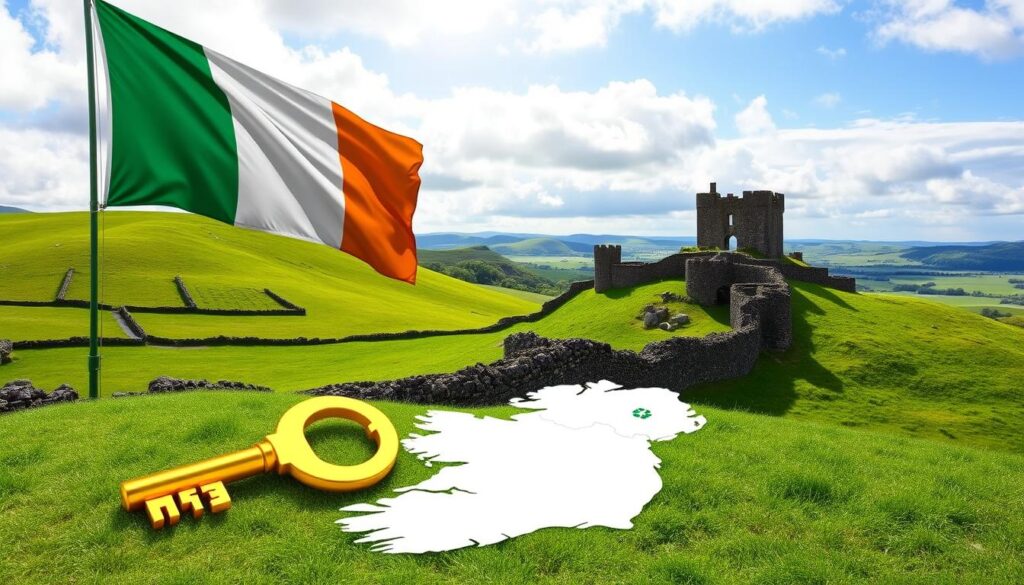Welcome to the comprehensive Ireland Citizenship By Investment Guide, tailored for individuals seeking opportunities for residency in Ireland through investment. The Irish Immigrant Investor Program (IIP), launched in 2012, stands as a preferred option for non-EEA nationals looking to make Ireland their home, granting residency in as little as four to six months1. This initiative requires qualifying applicants to possess a minimum net worth of €2,000,000 and offers various investment avenues, including Enterprise Investment and Real Estate Investment Trusts (REITs)12.
Securing an Irish Passport Through Investment not only provides access to lucrative educational opportunities in an advanced system but also opens doors to the broader EU market and the high quality of life Ireland is known for. With over 700 million euros raised through the program, it’s no surprise that 91% of applicants are from China, with Americans making up just 2%2. Join us as we explore the myriad benefits, investment options, and requirements associated with this appealing route to Irish citizenship.
Key Takeaways
- The Ireland Immigrant Investor Program was established in 2012.
- Residence can be obtained in as little as 3 to 4 months.
- A minimum net worth of €2,000,000 is required to qualify.
- Investors can access educational and healthcare benefits upon residency.
- The program grants renewable residency permits as a path to citizenship.
Introduction to Ireland Citizenship By Investment
The Ireland Citizenship By Investment program plays a pivotal role in attracting global talent and investment, allowing individuals to secure residency and citizenship through financial contributions. Initiated in 2012, the program, officially known as the Ireland Immigrant Investor Program (IIP), has become a favored route for investors seeking residency options in Irish society3. To qualify for the IIP, applicants must demonstrate a minimum net worth of €2 million and choose from four distinct investment avenues, which provide flexibility and options tailored to their needs4.
Recent trends indicate that over €800 million has been generated through nearly 1,200 investments under the IIP, showcasing its growing popularity among investors4. The program features a swift processing time of three to four months, making it an attractive choice for individuals looking to expedite their residency plans3. Notably, the IIP requires participants to spend merely one day per calendar year in Ireland, ensuring ease of compliance while enjoying economic benefits3.

As a member of both the European Union and the Schengen Area, Ireland offers visa-free travel to its citizens for 170 countries, further enhancing the appeal of the ROI Citizenship By Investment strategy3. With numerous Ireland Citizenship By Investment Options available, investors have the opportunity to contribute to sectors including high-tech and life sciences, further integrating themselves into the Irish economy and culture3.
What is the Irish Immigrant Investor Program (IIP)?
The Irish Immigrant Investor Program (IIP) was established in 2012, and it serves as a pathway for eligible non-EEA nationals to secure residency in Ireland through significant financial contributions. With a minimum net worth requirement of €2 million, participants can explore various investments such as enterprise investment, endowment options, investment funds, and Real Estate Investment Trusts (REIT)56.
This program has attracted notable investments, amounting to over €800 million, effectively contributing to the growth of Ireland’s economy5. It offers dependents the chance to join the main applicant, ensuring that spouses and children under 24 can benefit5. Furthermore, the program boasts a flexible residency requirement, which only necessitates that investors spend one day annually in Ireland, making it a highly attractive option for global investors5.
To initiate this journey towards securing Irish residency, participants should be mindful of the various investment options available. Each option comes with specific financial thresholds and conditions, ensuring that investors can find a suitable pathway aligned with their financial capacity and goals. Prospective applicants can find extensive information about the program’s benefits and requirements through the Irish Citizenship Investment Program.

How to Obtain Ireland Residency by Investment
Acquiring Ireland Residency by Investment involves a structured process that ensures adequate vetting of potential investors while simultaneously contributing to the Irish economy. To begin, it’s essential to understand the eligibility criteria and the subsequent steps in the application process.
Eligibility Criteria for Ireland Residency
To qualify for the Irish Immigrant Investor Program, applicants must meet certain criteria, including being at least 18 years old and a non-EEA national. A minimum net worth of €2 million is required, which must be sourced legally. Family members who may accompany the investor include legally recognized partners, children under 18 years, and dependent unmarried children under 24 years old7. The application process is inclusive of a non-refundable fee of €1,500 and typically takes about two months on average8.
Steps to Apply for Residency
The application for Ireland Residency By Investment consists of several steps:
- Initial submission of application without a firm investment commitment.
- Undergoing due diligence checks to assess the applicant’s background and financial status.
- Upon approval, making the required investment, which can be either €1 million in an enterprise or other government-approved options.
- Proving the investment which ensures compliance with the program’s requirements.
Investors can renew their residence permit every two years as long as they maintain their investment, and after five years in the program, they may apply for permanent residence or even citizenship9. Access to Ireland as a residence will facilitate various benefits, including visa-free travel to numerous countries and eligibility for lower EU tuition fees when residing in Ireland9.
Benefits of Ireland Residency by Investment Program
The Ireland Residency By Investment program offers a myriad of advantages that make it an attractive option for potential investors looking to establish residency in a thriving European locale. One of the primary benefits is the opportunity to gain unfettered access to the EU market, which opens numerous avenues for dynamic business ventures.
Access to the EU Market
Ireland serves as a gateway to the EU, attracting over 1000 multinational corporations due to its favorable low corporate tax rate of 12.5%10. These conditions create a flourishing environment for businesses and investors alike, allowing individuals to leverage their investments effectively while enjoying seamless access to the European marketplace11.
High-Quality Education System
The education system in Ireland is renowned globally, providing exceptional opportunities for children and young adults. According to the UN’s standard of living, Ireland ranks above the UK and US in terms of the quality of education12. Families relocating to Ireland through the ROI Citizenship By Investment program can benefit from world-class universities and educational resources available in the country.
Quality of Life and Healthcare
Ireland is recognized for its high standard of living, ranking favorably in metrics related to healthcare, lifestyle, and overall well-being11. The comprehensive healthcare services in Ireland complement its impressive lifestyle, making it an ideal location for families. The Irish Immigrant Investor Program further permits investors to stay in Ireland even after the initial investment period ends, facilitating their journey toward citizenship while enjoying all that the country offers10.

Understanding the Ireland Golden Visa
The Ireland Golden Visa program is an investment initiative designed to attract non-EU nationals, allowing them a pathway to Irish residency and eventual citizenship. The program reflects the former Immigrant Investor Program (IIP) and focuses on enabling individuals to engage with Ireland’s business environment without extensive pre-investment procedures. A key aspect of the Ireland Golden Visa is the opportunity it provides for investors to secure residency through significant investment contributions.
What is the Ireland Golden Visa?
The Ireland Golden Visa requires a minimum investment of €1 million from the applicant’s own resources, which must be committed for a minimum of three years13. Applicants need to demonstrate a minimum net worth of €2 million to qualify for the program13. Furthermore, this visa acts as a prime avenue for potential investors seeking to enjoy the benefits of living in Ireland.
How the Golden Visa Works
The Golden Visa operates by allowing individuals to invest in Ireland as a means of obtaining residency. All four investment options previously available under the IIP—Enterprise Investment, Endowment Investment, REIT, and Fund Investments—will no longer be available as the program has ceased accepting new applicants since 15 February 202314. Notably, existing projects approved under the program will not be impacted and will continue to attract new investors13. With ongoing immigration permissions for currently approved investors remaining valid and renewable, the program displays a level of continuity and resilience amidst evolving frameworks.
Among the adjustments, applications awaiting decisions will still be processed even after the program’s closure13. Additionally, projects significantly developed but not formally submitted will benefit from a three-month grace period to finalize and submit their documentation13. This flexibility supports investors while navigating the new landscape.

Investment Options for Ireland Citizenship By Investment
The Irish Citizenship Investment Program offers various pathways for individuals looking to gain residency through financial involvement in Ireland. Each option caters to different investor preferences, promoting economic development alongside providing a path to residency. The four primary Ireland Citizenship By Investment Options include:
Enterprise Investment
This option involves a minimum investment of €1 million in Irish enterprises for at least three years. Notably, 81% of applicants choose this route, reflecting its appeal among prospective investors. The Irish Immigrant Investor Program (IIP) was introduced in 2012 and has garnered more than €800 million in investments from resident investors15.
Investment Fund
Under this choice, applicants must invest a minimum of €1 million in a fund approved and regulated by the Central Bank of Ireland. This approach is designed to ensure that the investments contribute effectively to the Irish economy while satisfying the residency criteria.
Real Estate Investment Trust (REIT)
Investors selecting the REIT option must commit a minimum of €2 million in Irish REITs listed on the Irish Stock Exchange for a period of 3-5 years. After three years, investors can divest 50% of their shares and an additional 25% after four years, allowing for some liquidity while maintaining residency15.
Endowment Option
This option requires a minimum charitable contribution of €500,000 to projects benefiting the Irish public. This choice ranks as the second most popular among investors and embodies a commitment to enhancing community welfare within Ireland15.

Each of these pathways reflects unique opportunities tailored to various investor profiles, ensuring that participants can find the best fit for their aspirations while contributing positively to the Irish economy. The structure and flexibility of these options illustrate Ireland’s commitment to attracting global talent while fostering economic growth16.
Required Documents for Ireland Golden Visa
To successfully navigate the process of obtaining an Ireland Golden Visa, applicants must assemble a comprehensive portfolio of documents. Adhering to the Ireland Investor Visa Requirements is critical. Each category of documentation serves a distinct purpose in verifying eligibility and ensuring compliance with regulations.
Personal Documentation
Personal documentation is fundamental in the application process. Applicants must provide:
- Valid passport or identification
- Proof of residence
- Birth certificates of dependent children
- Marriage certificates, if applicable
Financial Documentation
Financial documentation ensures that applicants meet the required financial criteria for the program. Key documents include:
- Evidence of a minimum net worth of €2 million
- Proof of investment of at least €1 million in approved options
- Bank statements demonstrating financial capacity
- Evidence supporting the source of funds for the investment
The due diligence process involves checks such as Anti-Money Laundering and verification of the financial background to guarantee adherence to compliance measures, emphasizing the significance of accurate financial documentation1718.
Character References
Character references are equally vital in the application review. Applicants must submit:
- Letters of reference from reputable sources, such as employers or legal experts
- Documentation proving the applicant’s character and integrity
Demonstrating a clean criminal record is essential, as residency may be revoked if the investor is deemed a financial burden or faces legal issues. Understanding these requirements is essential for a smooth application process17.

| Document Type | Examples |
|---|---|
| Personal Documentation | Passports, residence proof, marriage certificates |
| Financial Documentation | Net worth statements, investment proof, source of funds |
| Character References | Reference letters, legal background check |
Renewal Process for Ireland Investor Visa
The renewal of the Investor Visa Ireland involves a systematic approach to ensure compliance with the program’s requirements. Initially granted for a duration of two years, the visa can be renewed for an additional three years, provided that applicants maintain their investment in approved projects and adhere to the stipulated conditions.
Duration of the Investor Visa
The Investor Visa Ireland is designed with a total potential duration of five years, divided into an initial two-year period followed by a three-year renewal phase. This structure allows investors to establish their commitment to the investment options and to contribute positively to the Irish economy.
Steps for Renewal
Renewing the Investor Visa Ireland requires comprehensive documentation to prove continued compliance with investment criteria. Applicants must:
- Submit proof of investment, indicating that the required minimum amount has been maintained for the duration.
- Provide updated documentation that reflects current residency status in Ireland.
- Undergo due diligence checks, emphasizing their adherence to regulations.
The entire process aims to assure that the investor remains a beneficial addition to the Irish community and economy. For detailed guidelines on the application process, you can visit this resource. Compliance with these steps is crucial for successful renewal; failure to meet the requirements can lead to the revocation of residency status.
Does Ireland Golden Visa Lead to Citizenship?
The Ireland Immigrant Investor Program provides a pathway not only for residency but also towards eventual citizenship. Investors who complete the residency requirements for five years can apply for Irish citizenship. This program has gained considerable recognition and appeal among non-EU nationals for its efficient transition from residency to citizenship.
Timeline for Citizenship Application
The citizenship application process typically takes about 12 months. Initially, applicants must demonstrate continuous residency in Ireland during the five-year period. All citizenship applications are subject to processing times that may vary based on the completeness and accuracy of the supporting documentation provided.
Requirements for Citizenship Application
To be eligible for citizenship through the Ireland Citizenship By Investment route, applicants must meet certain basic requirements. Continuous residency must be maintained throughout the five years, alongside proof of good character, which includes a clean criminal record. Other essential requirements include sufficient evidence of the investment made and adherence to all program stipulations throughout the residency period. These factors ultimately contribute to the assessment process for citizenship applications.
To explore further details about the investment options and compliance requirements, visit this link. The Ireland Citizenship By Investment program continues to draw attention for its promising advantages and streamlined processes1519.
Dual Citizenship in Ireland
Ireland welcomes the concept of dual citizenship in Ireland, allowing individuals to hold multiple nationalities. This flexibility is particularly appealing for investors and their families, as it enables them to enjoy the benefits associated with both citizenships while expanding their global opportunities. To achieve this, applicants must ensure that their home country recognizes dual citizenship, as this is a critical requirement.
The pathway to dual citizenship in Ireland is accessible through naturalization, descent, or investment. Those seeking citizenship through naturalization need to be residents in Ireland for a full year prior to application and for an additional four years in the eight years leading up to it20. Furthermore, the application process comes with costs, including a fee of EUR 175, along with separate charges depending on the age and circumstances of the applicant20.
Irish passport holders benefit immensely, enjoying rights to live, work, and study across the EU and several other regions, which is further enhanced by Ireland’s ranking as the fifth globally in terms of passport power, granting visa-free access to 187 countries21. Additionally, following the successful completion of the required application processes, new citizens must pledge loyalty to the state during a citizenship ceremony, solidifying their commitment to Ireland.
For individuals looking to settle in Ireland, the Ireland Investor Immigration Program (IIP) offers a streamlined route to Irish citizenship with minimal residency obligations compared to traditional naturalization, requiring only one day within each year of residency21. This program is particularly beneficial for investors who want to establish a base in Europe while maintaining their original nationality.
| Requirement | Naturalization | Investment (IIP) |
|---|---|---|
| Residency Requirement | 5 years (1 year continuous) | 1 day per year |
| Application Fee | EUR 175 + additional fees | EUR 175 + additional fees |
| Ceremony Required | Yes | No |
| Path to Citizenship | Yes, through residency | Yes, through investment |
Challenges and Considerations
Investing through the Irish Immigrant Investor Programme (IIP) provides numerous opportunities yet comes with its own set of challenges and considerations. Understanding the intricacies of residency requirements, along with the financial commitments and market risks, is vital for prospective investors seeking ROI Citizenship By Investment.
Understanding Residency Requirements
The IIP demands that participants comply with certain residency obligations. Specifically, individuals must spend at least one day in Ireland each calendar year to maintain their status within the program22. A significant court ruling in July 2019 further tightened residency rules for citizenship applications. Those applying for naturalization must be physically present in Ireland for four of the preceding eight years before the application, with the latest year reflecting continuous residence22. Outcomes for citizenship applications rest on the discretion of the Minister for Justice and Equality, who evaluates various factors such as criminal background, financial standing, and commitment to the State22.
Financial Commitment and Market Risks
Engaging in the IIP requires a substantial financial commitment. The investment amount must be fully committed for the required duration to qualify for naturalization22. Market risks, coupled with the economic environment, may influence the viability of the chosen investment path. Investors should remain mindful of potential financial shifts and assess the market landscape thoroughly. Furthermore, the investment migration industry reportedly generates nearly $22 billion annually, indicating the growing importance and risks associated with such financial endeavors23.
Conclusion
The Ireland Citizenship By Investment Guide presents a comprehensive pathway for individuals seeking to enhance their global mobility and secure long-term residency in a vibrant EU nation. With a clear understanding of the Irish Immigrant Investor Program (IIP) and its multifaceted benefits, potential investors can make educated decisions about their investment choices. The program offers various options, including enterprise investments and endowment options, which have attracted a significant number of applicants since its inception, leading to substantial economic benefits and job creation across sectors24.
Individuals can enjoy the freedom to travel visa-free to over 180 countries, including the ability to live and work in any of the 27 EU countries, further enhancing the allure of Irish citizenship2526. As the world continues to change, accessing such opportunities through the Irish Employee Investment Program not only provides a pathway to residency but also opens doors to prosperous living in an ever-evolving economic landscape.
Ultimately, the decision to engage with the Ireland Citizenship By Investment Guide should be rooted in thorough research and understanding of the associated requirements and responsibilities. By doing so, potential investors can navigate their journey toward Irish citizenship effectively, ensuring that they are well-prepared to embrace the many enriching experiences that Ireland has to offer2624.
FAQ
What is the Ireland Citizenship By Investment program?
The Ireland Citizenship By Investment program, also known as the Irish Immigrant Investor Program (IIP), allows non-EEA nationals to obtain residency and potentially citizenship in Ireland through qualifying investments.
What are the investment options available under the IIP?
The IIP offers four primary investment options: Enterprise Investment, Investment Fund, Real Estate Investment Trust (REIT), and the Endowment Option, catering to different investor profiles and objectives.
How long will it take to receive my Irish passport through investment?
The process typically requires five years of residency under the IIP before you can apply for Irish citizenship, with the citizenship application review taking around 12 months, depending on documentation accuracy.
What are the eligibility criteria for the Ireland Investor Visa?
Applicants must be at least 18 years old, non-EEA nationals, possess a net worth of €2 million, and have a clean criminal record to qualify for the Ireland Investor Visa.
How can I prove my investment for the renewal of my investor visa?
To renew your investor visa, you need to submit proof of your investment and updated documentation reflecting your residency status in Ireland.
What benefits does the IIP provide to investors and their families?
The IIP offers unrestricted access to the EU market, a high-quality education system, and an excellent healthcare system, contributing to a superior quality of life for residents and their families.
Can I maintain my original nationality if I become an Irish citizen?
Yes, Ireland allows dual citizenship, enabling you to keep your original nationality while also enjoying the advantages of Irish citizenship.
Are there any market risks associated with investing under the IIP?
Yes, potential investors should consider market risks and changing economic conditions that may impact their investment and long-term planning.
Is the Ireland Golden Visa different from the IIP?
The Ireland Golden Visa is a subset of the IIP, providing a pathway to citizenship after five years of residency acquired through investment.
Source Links
- https://www.globalcitizensolutions.com/ireland-golden-visa/
- https://nomadcapitalist.com/global-citizen/second-passport/ireland-golden-visa/
- https://citizenmatch.com/residency-programs/europe/ireland/
- https://etias.com/articles/ireland-citizenship-by-investment
- https://www.imidaily.com/the-ireland-immigrant-investor-programme/
- https://eternainternational.com/program/ireland-immigrant-investor-program/
- https://www.ivisa.com/ireland/blog/ireland-golden-visa
- https://www.schengenvisainfo.com/ireland-investor-visa/
- https://www.premiervisagroup.com/ireland
- https://www.idlf.ie/blog/why-choose-residency-by-investment-in-ireland
- https://immigrantinvest.com/blog/ireland-residency-by-investment-en/
- https://www.resideinireland.com/blog/why-choose-residency-by-investment-in-ireland
- https://best-citizenships.com/2023/09/06/qa-closing-of-ireland-golden-visa-program/
- https://www.citizensinformation.ie/en/moving-country/working-in-ireland/migrant-workers/coming-to-set-up-a-business-in-ireland/
- https://getgoldenvisa.com/citizenship-by-investment-ireland
- https://getgoldenvisa.com/get-irish-passport
- https://www.irishimmigration.ie/coming-to-live-in-ireland/i-want-to-invest-in-ireland/
- https://www.goldenvisas.com/ireland
- https://www.irelandinvestorvisa.com/
- https://wise.com/us/blog/how-to-get-citizenship-in-ireland
- https://www.bartrawealthadvisors.com/the-power-of-the-irish-passport/
- https://www.davidsonmorris.com/irish-citizenship-through-investment/
- https://www.cfr.org/in-brief/golden-passports-and-visas-how-investment-migration-works
- https://assets.gov.ie/49400/d0c92f93691f4c068a14fbaa3721678d.pdf
- https://getgoldenvisa.com/irish-citizenship
- https://eternainternational.com/vn/the-benefits-of-irish-citizenship-for-travel/

Comments